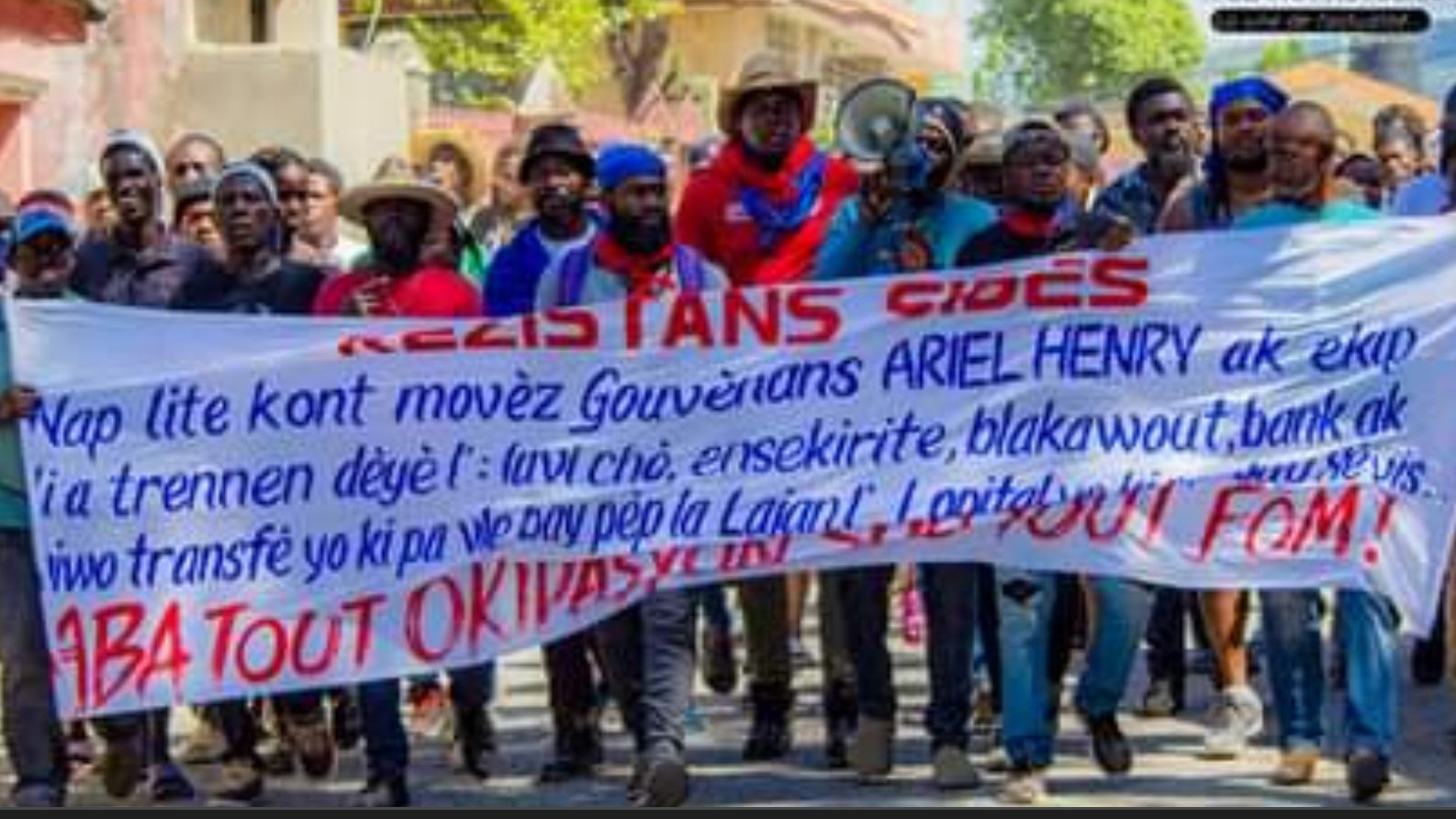For over two months, hundreds of thousands of Haitians have been taking to the streets across the country demanding the resignation of the US-backed de-facto president Ariel Henry and his administration. The people are demanding concrete responses to their emergencies, such as growing food insecurity, rampant inflation and severe fuel shortages. Haitians demand that the de-facto government of the ruling far-right Haitian Tèt Kale Party (PHTK) withdraw the suffocating increase of up to 128% in fuel prices, implemented on the request of the International Monetary Fund (IMF). They demand that the international community respect Haiti’s sovereignty and their right to self-determination, and cease supporting Henry’s illegitimate government and stop interfering in the country’s internal affairs.
The protests have intensified since October 10, following Henry’s request to the UN for international military assistance to fight criminal gangs. Many claim that this request is a disguise for the Henry administration’s efforts to remain in power. Citizens, civil society organizations and left-wing opposition parties have vehemently rejected Henry’s decision, pointing out that previous foreign military interventions did not solve Haiti’s issues, but rather deepened the crises in the country.
On Thursday, October 27, thousands hit the streets in various parts of the country demanding that Henry step down, and that the international community stay out of Haitian affairs.
October 27, 2022: Tigwav, #Haiti "stand firm to oust Ariel Henry with PHTK.
Tigwav says ABA occupation." pic.twitter.com/cNL7E7M5LP— HaitiInfoProj (@HaitiInfoProj) October 28, 2022
Despite widespread condemnation of its previous missions, the United Nations has been promoting the deployment of international troops in Haiti. The UN Security Council is debating a resolution by the US and Mexican governments to send a non-UN multinational force in Haiti. Despite the Haitian people’s explicit request for an end to all foreign interference in the country, the Canadian and the US governments are discussing forming an international force for Haiti.
On Wednesday October 26, Assistant Secretary of the US for Western Hemisphere Affairs Brian A. Nichols reported that the US Secretary of State Antony Blinken would visit Canada on Thursday and Friday to address, among other issues, the formation of a multilateral force for Haiti in response to gang violence.
On Tuesday October 25, the Miami Herald reported, citing anonymous sources, that the US government had been unable to persuade any ally to participate in an eventual international military intervention in Haiti.
Of the five permanent members of the UN Security Council, China and Russia expressed concern about the deployment of foreign forces in Haiti. France supported the resolution, but ruled out the possibility of contributing troops. Many non-permanent members also expressed skepticism, and demanded that a concrete plan be drawn up in writing before voting on the resolution.
Read more: The last thing Haiti needs is another military intervention
In this regard, Nichols said that he was confident the UNSC would pass a resolution allowing the formation of the international force in early November. He added that the direction of the force would be established in the coming days as discussions progressed between the US and Canada.
Last week, on October 21, the UNSC unanimously adopted a resolution that imposes sanctions and an arms embargo on the gangs that dominate large areas of Haiti and that have been blocking the supply of fuel and other basic products in the capital Port-au-Prince.
Earlier this month, on October 15, Canadian and United States military aircraft delivered “security equipment,” including tactical and armored vehicles and other supplies to Haiti to support the country’s police to fight criminal gangs.
Additionally, a day before, the Joe Biden administration sent the US Coast Guard vessel Northland to the country with the intention of “patrolling” the waters near Port-au-Prince. The US government said that the vessel was sent “as an additional sign of resolve and support for the people of Haiti.”
Thursday’s mobilizations were especially held in opposition to the US and Canadian governments.
Haitians do not want another foreign military intervention
Since the 1990s, the international community, especially the US, the UN, the OAS and the CORE group, has been constantly interfering in Haiti’s internal politics. Haitians hold the US and the UN responsible for their dire situation. They condemn these imperialist powers for organizing coups against democratically elected governments, and installing corrupt, neoliberal and puppet governments that follow their agenda in Haiti.
The Haitian people also condemn previous UN missions for bringing cholera, repressing social demonstrations, massacring civilians and sexually assaulting women and girls.
Haitians have stated that they will not allow another foreign occupation, and will continue fighting in defense of their sovereignty and keep struggling against imperialism and neo-colonialism.
Listen to this shit! 👇🏾 This Black face admits Henry is there to remove fuel subsidies as instructed by his masters to starve Haitians. Haitian Revolution 2.0 can’t start fast enough. https://t.co/izcE8ty2b7
— Jean Jacques Dessalines ✊🏾🇭🇹 (@JeanJacquesDes7) October 26, 2022





